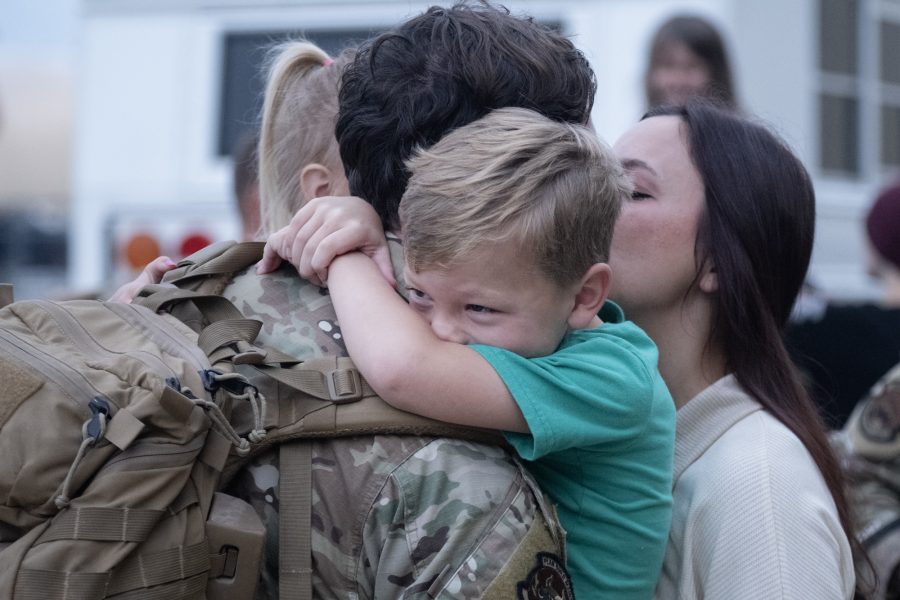With no end to the government shutdown in sight, Airmen, Guardians, and defense civilians face increasing uncertainty about whether or not they will be paid—and how to make ends meet if they are not.
The next military paychecks are due Oct. 31, when the next month’s rent, mortgage, childcare, and car payments will also come due.
The Pentagon found funds for the first payday after the shutdown, Oct. 15, tapping $8 billion in funds appropriated for research, development, test, and evaluation. Officials expect to find additional unspent money to fund Oct. 31 paychecks.
Beyond that, however, the outlook is uncertain, as neither Republicans nor Democrats show any sign of wavering resolve over the shutdown. Treasury Secretary Scott Bessent warned Oct. 26 that should the shutdown extend to the Nov. 15 payday, troops won’t be paid.
Retired Maj. Gen. Ed Thomas, chief executive officer at the Air Force Aid Society, is watching those plans closely. “It’s a dynamic situation,” he said. “What we’re particularly concerned about is the mid-month paycheck. If the government shutdown is not resolved before we get to Nov. 15, we are deeply concerned that service members may miss a paycheck.”
Most defense civilians are not being paid, and many contract personnel are also not receiving pay during the shutdown. Some federal civilians received partial paychecks as the fiscal year ran out at the end of September.
Many two-income military families are operating on just one check as a result. A 2021 Government Accountability Office study estimated that some 69,000 military spouses work for the Department of Defense or a related entity, or about one in four of an estimated 270,000 military spouses employed full-or part-time. A 2025 research report from Syracuse University’s Institute for Veterans and Military Families estimated that 10.3 percent of some 901,000 military spouses—or roughly 93,000—worked for the federal government, “a rate 11.864 times higher than that of civilian spouses.”
For those military families, financial hardship is already here. And the chance that both paychecks could stop poses a still more serious threat.
“It could be a double hit for many,” said Thomas.
Relief Programs
Financial institutions catering to military and federal employees are offering a variety of shutdown relief programs, including paycheck advances loans and deferred payment options. But these are not open to all.
Both PenFed Credit Union and USAA offer paycheck loans up to $6,000 per pay period to qualifying federal and military members. To qualify, members must have direct deposit set up and meet credit requirements.
USAA has already issued 91,000 such no-interest loans, said JJ Montanaro, a financial advice director at USAA.
PenFed has a similar program; As long as members have a direct deposit that receives a paycheck from the federal government, said Executive Vice President of member operations and global fixed assets Jamie Gayton, “we can replace that paycheck, up to $6,000, and then what happens is, after the shutdown ends and they get repaid, then we’ll go back in and pull that money out.”
For car and credit card bills, PenFed has approved 2,240 applications for members to skip a monthly payment, Gayton said.
Whether furloughed workers get paid later is unclear. President Donald Trump has threatened to not provide backpay, but Congress has consistently approved backpay after past shutdowns.
“The law says that they will receive backpay for any of the payments that they don’t receive,” said Gayton, a retired U.S. Army colonel. “That’s what happened in the past … so we’re very comfortable taking care of our members and then working through that process down the road.”
USAA has also likewise approved “tens of thousands” of dollars in credit card payment relief for members affected by the shutdown, Montanaro said.
Other banks also have programs. Members struggling should contact their financial institutions, Thomas said. And those who don’t qualify may be able to get support elsewhere.
“Not everybody qualifies for those” bank programs, Thomas said. “There are requirements that come with those, so what I would tell you is there is not one place outside of the federal government that can solve this problem for our Airmen and Guardians.”
So far, base services such as childcare and libraries are funded by non-appropriated funds and still operating, an Air Force spokesperson told Air & Space Forces Magazine.
The Air Force put out guidance for Airmen, Guardians, and spouses on Sept. 30 to help weather the uncertainty of the shutdown.
Yet some of that guidance could soon be out of date or unclear.
For example, it recommends service members look into the Department of Agriculture’s Supplemental Nutrition Assistance Program, or SNAP, but President Trump has stated that those benefits will not be available as of Nov. 1. According to media reports, several states are planning to sue over the administration’ decision, but November benefits are unlikely to be available.
Thomas advised that military members should keep checking for updates on available resources as the shutdown continues.
For example, the Air Force Aid Society’s website states that it is “currently not accepting applications for financial assistance related to the government shutdown.”
“Once the [Trump] administration made assurances that military members would be paid, we stopped accepting applications from active duty,” Thomas explained. “However, we have paid out more than $1 million to help service members and their families that have been under strain from the government shutdown. That includes Active, Guard, and Reserve.”
Thomas said the statement on the AFAS website will be updated as the situation unfolds.


